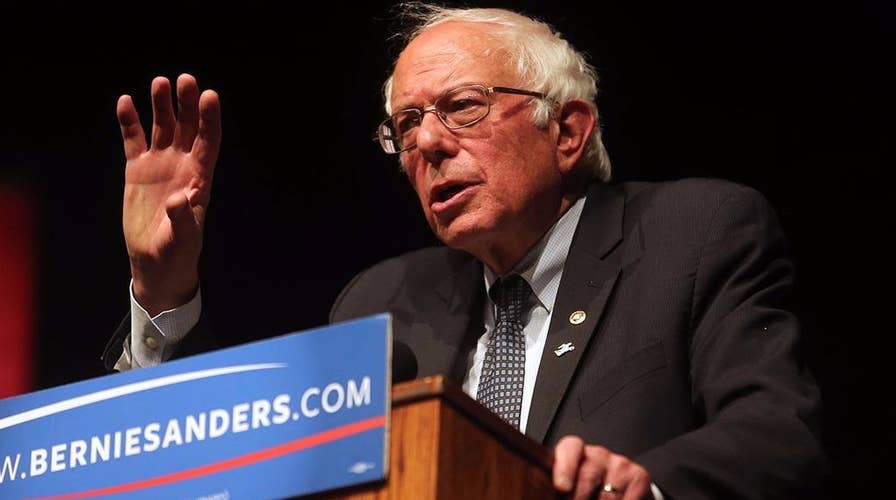Can Sanders make up ground with minority voters?
Strategy Room: Basil Smikle Jr. and Brian Morgenstern discuss Democratic candidates' push to win support from minority voters ahead of New York primary
Bernie Sanders, even as he struggles to win over black voters from Hillary Clinton’s side, appears to be making gains among Hispanics -- including in key primary states like New York and California, where a total of 722 delegates are at stake.
The Sanders campaign points to several recent polls, including those showing the Vermont senator essentially tied with Clinton nationally for the Hispanic vote and having largely closed a double-digit gap with Clinton among Hispanic voters in California.
Sanders pollster Ben Tulchin told FoxNews.com on Monday the campaign thinks it finally has caught up with Clinton in terms of message and name recognition, especially among Latinos who have supported Clinton as far back as 2008, when she ran for president against Barack Obama.
“Look at the national polls. The campaign is now doing better than ever, and Latinos are part of it,” said Tulchin, who touted Sanders’ popularity among young, working-class Hispanics. “Bernie has a very powerful message that includes health care for all and free college tuition. … New York has a huge Latino population, and California is the prize of the elections.”
Nationally among all voters, polls show Sanders has now pulled roughly even with the front-running Clinton at about 48 percent. He has won seven of the last eight contests.
After the New York Democratic presidential primary on Tuesday, in which 247 delegates are at stake, Sanders and Clinton will eventually compete in California on June 7, for 475 delegates, the most of any state.
The Clinton campaign did not return a request Monday for comment.
An April 11 poll for the NY 1 news station showed Sanders leading Clinton in New York 55-38 percent among Hispanic voters.
A national poll released four days earlier, by the nonpartisan Public Religion Research Institute, found Democratic-leaning Hispanic voters preferred Sanders over the front-running Clinton 48-47 percent.
The California poll was released April 8 by the nonpartisan Field Research Corp. It found Sanders now trails Clinton 42-49 percent among Hispanic likely Democratic primary voters, after trailing 35-53 percent in January.
Sanders’ gains with Hispanic voters stand in stark contrast to his ability to win over black supporters, something he failed to do in primary races across the South.
Despite big outreach efforts ahead of the Feb. 27 South Carolina Democratic primary, Clinton won roughly 80 percent of the black vote. Sanders was never able to break through the so-called “firewall” that black voters had created for Clinton across the region.
“Secretary Clinton cleaned our clock in the Deep South,” Sanders said in last week’s CNN debate. “We got murdered there.”
Still, Sanders nearly beat Clinton in the Feb. 20 Nevada Democratic caucuses with the help of the Latino vote.
The Clinton campaign continues to dispute entrance poll numbers, touted by the Sanders camp, showing Sanders won the Latino vote by 8 percentage points. However, the larger point, Tulchin argued Monday, is the Latino vote helped Sanders close on Clinton’s early, double-digit lead.
Sanders still faces a daunting task of catching Clinton in the race to get 2,383 delegates before the July convention. Clinton leads in the delegate count, 1,758-1,076, with New York, California and just 15 other contests remaining.
As the country’s fasting-growing minority, Hispanics have become an increasingly important voting bloc for Democrats and Republicans.
In the 2012 presidential race, President Obama won at least 70 percent of the Hispanic vote, out of an estimated 23.3 million eligible Hispanic voters. Hispanics account for roughly 9 percent of the total eligible vote, essentially unchanged from 2012.
However, a recent Pew Research Center analysis of Census Bureau data shows an additional 4 million more Hispanics are eligible to vote this cycle, with those 35 or younger accounting for nearly half of the increase, good news for Sanders who is widely popular among millennials.
Jessica Levinson, a professor at Loyola University Law School in Los Angeles, on Monday acknowledged the value of the Hispanic vote in the state’s Democratic primary.
But she argued Sanders will need a strong voter turnout, as he does in other states, to do well, considering Hispanic residents are under-represented in terms of registered voters.
“Hispanics could be a big voting bloc, extremely powerful,” said Levinson, who specializes in election law. “But they have to do two things -- register and show up.”
Levinson says Clinton still appears to have the overall advantage considering “she has a better ground game and support from party elders.”
And the contest could in large part be determined by who has the money to compete in California’s expensive TV market.
“It’s about commercial advertising, not retail politics,” Levinson said.





